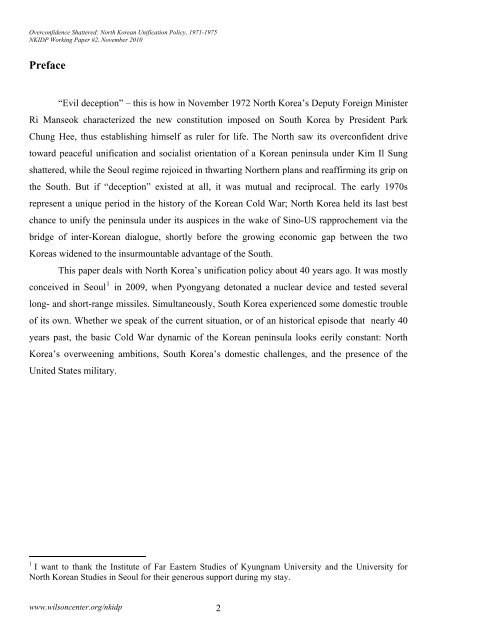<strong>Overconfidence</strong> <strong>Shattered</strong>: <strong>North</strong> <strong>Korean</strong> <strong>Unification</strong> <strong>Policy</strong>, <strong>1971</strong>-1975NKIDP Working Paper #2, November 2010Preface“Evil deception” – this is how in November 1972 <strong>North</strong> Korea’s Deputy Foreign MinisterRi Manseok characterized the new constitution imposed on South Korea by President ParkChung Hee, thus establishing himself as ruler for life. The <strong>North</strong> saw its overconfident drivetoward peaceful unification and socialist orientation of a <strong>Korean</strong> peninsula under Kim Il Sungshattered, while the Seoul regime rejoiced in thwarting <strong>North</strong>ern plans and reaffirming its grip onthe South. But if “deception” existed at all, it was mutual and reciprocal. The early 1970srepresent a unique period in the history of the <strong>Korean</strong> Cold War; <strong>North</strong> Korea held its last bestchance to unify the peninsula under its auspices in the wake of Sino-US rapprochement via thebridge of inter-<strong>Korean</strong> dialogue, shortly before the growing economic gap between the twoKoreas widened to the insurmountable advantage of the South.This paper deals with <strong>North</strong> Korea’s unification policy about 40 years ago. It was mostlyconceived in Seoul 1 in 2009, when Pyongyang detonated a nuclear device and tested severallong- and short-range missiles. Simultaneously, South Korea experienced some domestic troubleof its own. Whether we speak of the current situation, or of an historical episode that nearly 40years past, the basic Cold War dynamic of the <strong>Korean</strong> peninsula looks eerily constant: <strong>North</strong>Korea’s overweening ambitions, South Korea’s domestic challenges, and the presence of theUnited States military.1 I want to thank the Institute of Far Eastern Studies of Kyungnam University and the University for<strong>North</strong> <strong>Korean</strong> Studies in Seoul for their generous support during my stay.www.wilsoncenter.org/nkidp 2
Bernd SchaeferNKIDP Working Paper #2, December 2010I. The China FactorFor most of its history, the Democratic People’s Republic of Korea (DPRK) maintainedcloser ties with the People’s Republic of China (PRC) than with any other country. This was trueuntil 1965, and again with gradually increasing intensity from 1970. For the study of <strong>North</strong><strong>Korean</strong> unification strategies after 1970, therefore, the Chinese factor is essential andparamount. 2 Yet, so far this dynamic has been largely absent from analyses of the <strong>North</strong>’sstrategies for unification. 3Before 1966, China had advocated leftist radicalism and did not exclude militaryadventurism as a solution to the <strong>Korean</strong> problem. In 1962 in particular, Soviet diplomats andtheir Eastern European allies in Pyongyang suffered through war scares and feared the outbreakof another devastating conflict on the <strong>Korean</strong> peninsula. However, with the launch of theCultural Revolution in 1966, China became preoccupied by domestic events and the DPRK wassuddenly left to its own devices on how to pursue reunification. When <strong>North</strong> <strong>Korean</strong> leader KimIl Sung defied China’s strong requests to emulate the Cultural Revolution in his own country, hisposition at the helm of the DPRK became endangered by spillovers of China’s CulturalRevolution into Korea and demands for his overthrow. Yet at the same time Kim daringly wenton the ideological offensive to cast himself as East Asia’s preeminent socialist leader with globalappeal.Simultaneously, the Vietnamese struggle to reunify a communist <strong>North</strong> and a capitalistSouth through the latter’s revolutionary uprising inspired constant rivalry and contest betweenPyongyang and Hanoi. <strong>North</strong> Korea was jealous of <strong>North</strong> Vietnam’s global revolutionarypedigree, and claimed in its propaganda to be playing in the same league. Vietnam looked downon <strong>North</strong> Korea for its failure to turn South Korea into a battleground for revolutionaryadvancement, as <strong>North</strong> Vietnam had succeeded in doing in South Vietnam. Not that the DPRK2 For a more detailed account: Bernd Schaefer, <strong>North</strong> <strong>Korean</strong> Adventurism and China’s Long Shadow,1966-1972, CWIHP Working Paper # 44, Washington D.C. 2004(http://www.wilsoncenter.org/topics/pubs/swp44.pdf). Also: Chin O. Chung, Pyongyang between Pekingand Moscow: <strong>North</strong> Korea’s Involvement in the Sino-Soviet Dispute, 1958-1975 (Tuscaloosa: Universityof Alabama Press, 1978).3 Chung Chong-Shik / Kim Hak-Joon, <strong>Korean</strong> <strong>Unification</strong> Problems in the 1970s (Seoul: Research Centerfor Peace and <strong>Unification</strong>, 1980); Kim Hak-Joon, The <strong>Unification</strong> <strong>Policy</strong> of South and <strong>North</strong> Korea: AComparative Study (Seoul: Seoul National University Press, 1977).3www.wilsoncenter.org/nkidp
















